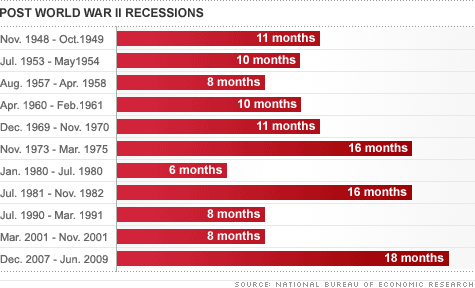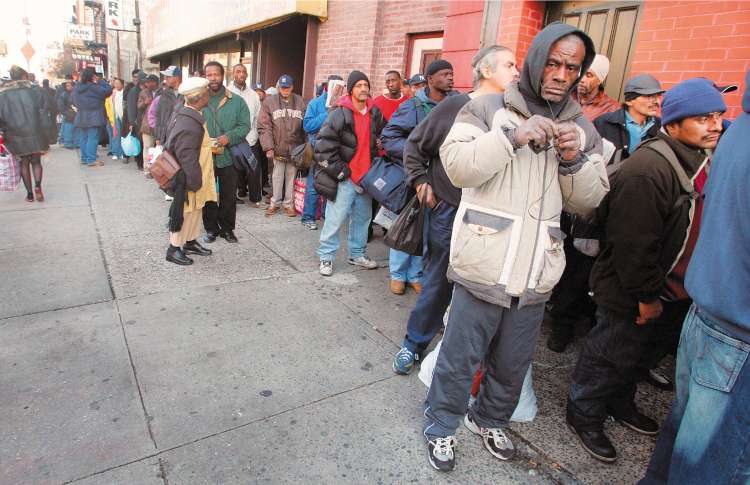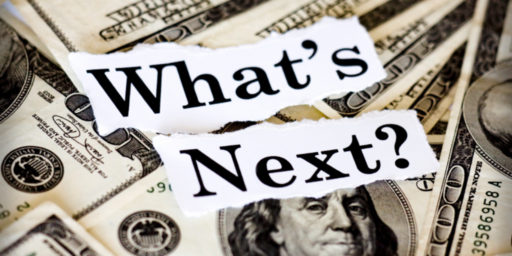Great Recession Ended June 2009
Great news, everybody: The biggest economic calamity since the Great Depression has been over for well over a year.
Great news, everybody: The biggest economic calamity since the Great Depression has been over for well over a year.
The Great Recession ended in June 2009, according to the body charged with dating when economic downturns begin and end. But the news comes amid rising fears of a double-dip recession.
The National Bureau of Economic Research, an independent group of economists, released a statement Monday saying economic data now clearly points to the economy turning higher last summer.
That makes the 18-month recession that started in December 2007 the longest and deepest downturn for the U.S. economy since the Great Depression.
The NBER acknowledged the risk of double-dip recession in its statement, but said “The committee decided that any future downturn of the economy would be a new recession and not a continuation of the recession that began in December 2007. The basis for this decision was the length and strength of the recovery to date.”
The committee that made the finding said it “did not conclude that economic conditions since that month have been favorable or that the economy has returned to operating at normal capacity.” Rather, it decided that June was when the economy hit bottom, and that it has been slowly but steadily growing since then.
“Economic activity is typically below normal in the early stages of an expansion, and it sometimes remains so well into the expansion,” said the NBER.
Most economists have been saying for months that the recession likely ended in the summer of 2009.
“No, we are not still in a recession as some people have asserted,” said Barry Ritholtz, CEO of Fusion IQ, a research firm based in New York. “No, it’s not a depression. The wheel has turned, the trough is more than a year behind us. This is not a robust recovery, but the economy is now expanding, not contracting.”
See the full NBER report here. Ritholz has some more charts and insights at The Big Picture.
This isn’t exactly news, in that we’ve been pretty confident for some time that the technical end of the recession happened last summer. And, frankly, the announcement is likely to be met with sneers from the general public, what with the flatness of the recovery and the fact that the miserable jobs picture isn’t clearing up anytime soon.
The prospect of a “double dip” is particularly unwelcome. Ritholtz places the risk in the 20% to 30% range and the most pessimistic put it in the 40% range.
As to whether “the economy has returned to operating at normal capacity,” there’s a very real chance, sadly, that it has. As Dave Schuler has said repeatedly: This may well be the recovery. A lot of the jobs that went away during this crisis are simply not coming back. And it’s not clear what’s going to replace them in the short- or medium-term.
Update (Steve Verdon):
I don’t find this announcement all that surprising given the growth we’ve been seeing in GDP. However, as James has already mentioned there is concern for a double dip recession as GDP growth has become rather phlegmatic. James Hamilton’s Econbroswer Emoticon has been neutral since August, but he does point out that by itself this does not mean the recession is over. However, he does have another measure that does signify when recessions have begun and ended (note this tool is not predictive, but retrospective), The Econbrowser Recession Indicator Index this indicator put the end of the recession in the second quarter of 2009–i.e. it is consistent with the NBER’s end date of June 2009. As for concerns of a double dip here is James’ post on that.
What I’m still seeing is what I had been expecting and what I continue to expect for the rest of this year– weak growth, but growth nonetheless.
I don’t think this is out of line with Ritholz either. While the above is Prof. Hamilton’s expectations I certainly wouldn’t read that as to preclude the economy slipping back into recession.






So it appears how we define recession should be changed. The economy has certainly changed over time so our economists might need to change as well.
For the American public unemployment is the measure of economic prosperity.
Wow…no comments….errr FIRST!!
Dammit Plunk!!
Oh great, just a year and $787 billion dollars late. And isn’t there a economist mail list or something so they could let Krugman in on the good news? Worse still, this recover is all Bush’s fault given the slow start Obama had.
Still I predict with benefits running out, savings depleted, friends and family fully leveraged and no real job prospects going into a long hard winter, this recovery is going to feel like a fumble. Let’s hope with a change in congress someone will be able to pick up the ball and run with it.
Is that all there is?
Is that all there is?
If that’s all there is my friend,
Then let’s keep dancing.
Let’s bring out the booze,
And have a ball.
If that’s all, there is.
The decline of the Detroit Lions has ended as well.
When I read this news this morning I didn’t feel a strong reaction. As we’ve said in past cycles, NBER has their definition of recession … and at this point I’m not sure I really even have mine. Painting colored “recession” zones on historical graphs (of GDP or unemployment) is of limited value.
It does feel nice that stocks are up today.
I will say that my favorite data source, the Consumer Metrics Institute, seems to be drifting out of sync with others as time goes on. I guess we’ll see if they are truly the bellwether or … just off somewhere.
Well it isn’t a strong recovery…so I guess that fits.
Not sure what everyone is concerned about. We teach economics students that a recession is the downward segment of the Business Cycle. Once you pass the trough the recession is over. Appears everyone is talking about the veracity of the expansionary phase of the cycle.
I feel so much better knowing there really hasn’t been anything to worry about for the past 14 months
I’m with Mike. I guess everyone just misunderstands or misuses the term “recession”, as if it vaguely means “economy is in bad shape”. Whose fault is that?
And Doug, -5 yards for uncalled-for snark. “End of recession” doesn’t equal “economy is super!”. Anyone who’s serious about the economy and policy has admitted that the recovery is tepid and times are still tough for a lot of people.
” However, as James has already mentioned there is concern for a double dip recession as GDP growth has become rather phlegmatic.”
Concern has largely evaporated, which is why the market has spurted over the past couple of weeks.
” Painting colored “recession” zones on historical graphs (of GDP or unemployment) is of limited value.”
I suppose it is if you have no respect for data unless it emanates from self appointed and entirely speculative sources.
Given that this is a recovery since the worst recession since the thirties(and caused by a financial crash rather than monetary tightening)
why is anyone suprised that recovery is a sawtooth. The problem at the moment (as Krugman correctly points out) is “It’s the demand, stupid”
If you believe in a natural rate of economic expansion, and reversion to the mean, you could make a recession gauge which started at the downturn past normal expansion, and ended when normal growth resumed.
Presidents might not like that measure.
This the same Krugman that predicted robust growth?
One problem…in the past economic growth after the trough has often been well above normal. Not exactly very help calling a period of above normal economic growth a recession.
Hey Joe, the stock market has spurted the last couple of weeks? Did you work for Madoff? Have you paid attention to the low volume associated with the market? The market is being traded by people who need to trade it for a small number of investors. It is hardly an accurate indicator of the direction of the economy with so little volume.
Bob Shiller has an interesting summary of the paper, “After the Fall,” was written by economists Carmen Reinhart and Vincent Reinhart. Their work draws upon a recent book that Carmen Reinhart co-authored with Kenneth Rogoff, entitled This Time Is Different: Eight Centuries of Financial Folly.
http://www.project-syndicate.org/commentary/shiller73/English
Above I said “If you believe in a natural rate of economic expansion [etc.].” Their study seems to say that the natural rate can be reduced by such a severe cycle, stretching the time it takes to be “over” to a decade, or more.